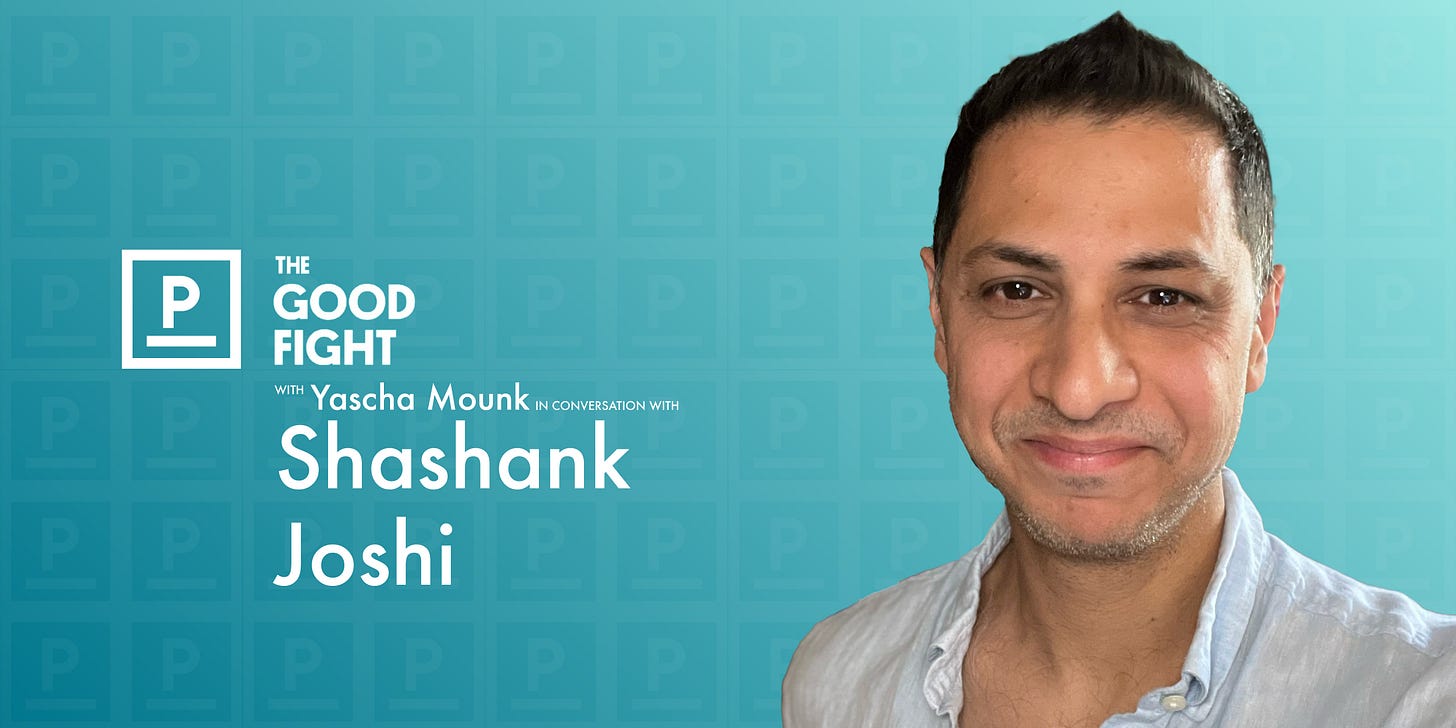Shashank Joshi is Defence Editor for The Economist and serves on the Advisory Board at the Royal United Services Institute (RUSI) in London.
In this week’s conversation, Yascha Mounk and Shashank Joshi discuss the state of the war in Ukraine, whether European solidarity will survive a cold winter, and why countries like India and China remain tied to Russia.
This conversation was recorded on October 6th, 2022. The transcript has been condensed and lightly edited for clarity.
Yascha Mounk: You've been covering Ukraine a lot over the last months. What can we ultimately expect in terms of the relative strength of the Ukrainian and Russian armies, and what might that mean for the ultimate outcome of the war?
Shashank Joshi: There was a real chance the Russian lines would have collapsed had Vladimir Putin not done what he had tried so hard to avoid doing for the whole war—mobilizing manpower from across the country. That was an indication of failure, and an admission that the war was going very badly. And now that it's happened, he's still on the back foot. He's still being chased back, indeed, as we speak, in Luhansk province in the east and in Kherson province in the south. But Russia still sits on about 15% of Ukrainian territory, which is huge. And not only that, but it sits on Ukraine's access to much of the Black Sea. It controls much of the breadbasket of southern Ukraine and big industrial areas in the east. So I think Russia is losing this conflict. But that doesn't mean it's lost. It's still in a territorially strong position.
What is really going to determine this is who comes out stronger in the spring, in March and April. The reason is the weather. The Ukrainians are doing really well. But their attacks are probably going to slow down, barring some kind of surprise collapse of the Russian lines. It's going to get wet and muddy. You can't get your tanks off-road, so they have to go on the road, which means they can be spotted more easily. You can't get drones up in the air, because it's foggy and difficult to see. People have to spend more time just keeping warm.
Mounk: On that point, Russia’s mobilization is really going to matter, because many of those people need real training in order to be effective. And as long as the Russian lines hold through the winter, Russia now has four or five months to get them ready for combat.
Do you think that the recent Ukrainian successes are a reason to be very optimistic about Ukrainian capabilities in the spring as well? Or do you think that, because of the arrival of Russian reservists, the situation may look very different in the spring?
Joshi: What matters more in warfare, mass or quality? This situation is a crucial test of that long-running debate. My own view is that Russia is going to struggle to turn its manpower advantage into an effective battlefield advantage. It has a lot of bodies. It can literally dragoon these people into service. But can it equip them? Can it arm them? Can it give them armored vehicles? Officers to lead them? Can it train them? I'm really skeptical. The sullen 16-year-old pulled off the streets of Vladivostok and told “Hey, you're defending the Motherland in our new frontiers, in a place you've never heard of before, in Kherson province”—how are these people really going to fight? I think the Ukrainians are fighting for survival. And not just that, but they're being trained by us. Literally, where I'm sitting in the UK, we're training up huge numbers of Ukrainians, helped by trainers from across Europe, the US and other places like Australia and Canada. I think that advantage is going to make itself felt in the spring if—and here's a really big if—we keep giving them weapons.
Mounk: I guess there are two big political question marks here, and one is about the extent of Western solidarity with Ukraine. We obviously have a hard winter coming up in which energy prices are going to be very high. It's possible that certainly parts of industry and possibly even private households are going to struggle to get the energy they need. Might all of that give an opening to political forces within the West who want to reduce support to Ukraine?
Joshi: I'm really optimistic about European cohesion. You know, back in the summer when Ukraine was on the backfoot in the east, I was worried. And I was worried about European energy in particular. We in the UK are going to have a really tough winter with gas prices and gas supply, as will a lot of other countries. But overall, I think we're in a much stronger position than anyone had a right to expect back in the summer. European governments have spent about $500 billion to insulate citizens from energy price spikes. It's not going to solve the problem. But they have basically thrown money at the problem to try and insulate their citizens from feeling the effect of this. European gas storage is more than 89% filled—well above the average for this time of year. We will have a huge problem next winter, and the winter after that could be incredibly miserable. But for this winter, I think we're gonna get through it.
A few weeks ago, 74% of Germans told pollsters that they basically favored maintaining support for Ukraine despite rising energy prices. And that was up from 70% in July. And this is Germany—not the most Russia-hawkish country out there. If that's the mood in Germany, you can imagine what it's like in other places. So overall, I think European cohesion is looking really impressive. The midterms, yes, could be an issue. But even if you look at elections in other countries, the Italians—the Italians, thank God, have managed to find the one far-right leader in Europe who is not pro-Putin. I don't think we could have asked for more than that in the current circumstances that we're in.
In the short term, the absolute priority is just trying to substitute for Russian gas in any way we can. And Norway is a huge part of this. Norway is not a member of the EU. But it's replaced the Russians as the EU's biggest supplier of gas, and it's looking to try and boost gas production. And this is really important right now, because we have just seen, for example, an attack on the Nord Stream pipelines that run through the Baltic Sea. They weren't actively providing gas to Europe: they had been shut down in various forms. But I think it was a shot across the bow that says, “We took out these pipelines; we can also take out Norway’s pipelines.” And if there is a disruption to those pipelines, that would be much, much more difficult for Europe.
Mounk: To draw out the implication here: you're assuming that it was Russia that was behind these attacks?
Joshi: I've spoken to a lot of European officials in recent days and weeks. I was in Helsinki not long ago. Every single senior European official I spoke to said they haven't got hard proof, at the time that we're speaking, of Russian culpability. But let me tell you: not a single one doubted that it was anything other than Russia. I know we've had some more wild speculative theories that it could have been the Americans trying to sabotage the pipeline or the Poles trying to drive a wedge between the Russians and the Europeans to drive escalation—I think that's nonsense. Occam's Razor: it was the Russians.
Mounk: I find it really hard to imagine Jake Sullivan (Biden’s National Security Advisor), who was a guest on this podcast, and Joe Biden greenlighting this attack on European gas pipelines. It just feels so much out of character with the mainstream foreign policy thinking of the Democratic Party. I don't mean to be naive about this. Obviously, they are running big drone campaigns against terrorists in parts of the world and so on, and it's clear to me that parts of the US security state are certainly less than polite. But there's something about the huge risk involved in undermining the infrastructure of America's closest allies in this kind of way—I find it very, very hard to see the current administration greenlighting it.
Joshi: It doesn't fit with what we know of their approach to escalation in this conflict, which has been very focused and very cautious and very incremental and steady, and ramping up support to Ukraine bit by bit, whilst trying to manage all of the other escalatory dynamics around that.
But just to finish on energy: it's not just gas, it's not just the pipeline. Europeans are also reliant on countries like Qatar and Algeria. And of course, this is why the decision by OPEC+ to effectively cut production and raise oil prices was such a blow, because we had hoped they would ease energy pressure right now. Instead, they've tightened it. It shows us that energy is still so fundamental to Europeans in a way that it's not for Americans. America is energy independent by and large; Europe is not. And this really changes the way Europe approaches crises. It also creates a horrible tension between the liberal values inherent in the Ukraine war—fighting for a democracy against a state that is increasingly fascist, unfortunately—and the potential need to go cap-in-hand to some pretty unsavory Middle Eastern regimes and others to say, “Would you please bail us out of this energy predicament so that we can keep fighting the fascists?”
Mounk: When will Europe actually have decreased its reliance on Russian gas on a more sustainable footing?
Joshi: This is a really difficult question, because it touches upon some big European divisions. We see France, for example, where there's a strong emphasis on saying, “Look, this is our opportunity to take advantage of this crisis and move towards net zero. Let's emphasize nuclear power.” And then of course in Germany (although the debate is changing), coalition politics means nuclear power is still something to work around. And in other countries you have politics getting in the way. Now, with the caveat that I'm not an energy person, my understanding is that the Netherlands has Europe's biggest gas field, which is almost dormant and effectively switched off. They could turn that on and immediately transform Europe's energy prospects dramatically. And yet, the coalition politics of the Netherlands doesn't permit that. So, the state that Europe will be in in a few years doesn't just depend on infrastructure choices, such as whether we can plow enough money into Liquefied Natural Gas terminals. It also depends on those big European debates that are playing out within the EU and in other places.
But to be absolutely honest, I think some European governments will be hoping that things don't get that far: “Let's hope the war ends, and maybe Putin goes, and we can go back to business as usual by next Christmas, and save our citizens rebelling on us because we haven't given them enough gas to keep their houses warm.”
Mounk: I would hope that the European political elite has finally realized that if it wants to be sovereign, it needs to end its reliance on Russian gas in the long term.
The second topic I want to address is the hope that Putin might somehow go. It's really hard to predict the downfall of authoritarian regimes, and it certainly is difficult to predict when particular dictators are replaced by potential successors. But how realistic are the prospects of real change in the Russian government, and would it matter? Would it actually change Russia's posture in this war?
Joshi: A few months ago, I would have dismissed the idea that Putin is going to fall as being overly optimistic. But I look at it now, and Putin’s support is really looking cagey. He didn't want to mobilize for a reason: a war that he could prosecute while sparing his population and keeping them quiescent is going to become very different once young men are hauled off to be fed into the meat grinder. It is already provoking protests, particularly in poor areas and among ethnic minorities in places like Dagestan. People who were willing to tolerate the conflict because it didn't really affect them are now going to find that the war is touching them in interesting ways. 200,000 Russians have fled to Kazakhstan. 70,000 to Georgia. 66,000 to the European Union, even though Latvia, Estonia and Finland have basically shut their borders. We are witnessing a massive exodus.
When we hear the Russians talk about 300,000 reservists, I don't believe that this is going to be a rolling campaign of mobilization—as many as it takes, for as long as it takes—because Putin hopes that European cohesion will crumble. I think that his position is much shakier than we've previously thought. Look at the astonishing attacks on him from people who are effectively Kremlin loyalists.
Now, who replaces him? This is a really interesting question, because the people around him are all ex-KGB, and they're in their late 60s. They're all heavily sanctioned. It's not as if there are liberals-in-waiting who can hit the reset button the minute he's off the scene. There may be shock scenarios where he leaves in chaos—it's possible, and we in Europe have to be prepared for it. But I think we’re just as likely to see a kind of post-Khrushchev scenario: being eased out by his cabinet gently, quietly. Or the post-Brezhnev transition: it took several years to get to a Gorbachev-like figure who could really reset relations with the West.
The regime has united around this conflict. But that doesn't mean they wanted it. That doesn't mean they were hungry for it. And the upside of an end to the war would be huge. I think Russia's economy is due to contract by about a third next year. And the longer this goes on, the greater the impact of the enormous brain drain that is crippling Russia's economy, the sanctions that mean that it can't get semiconductors and other absolutely vital components, and the reorientation of its energy and economic relationship to the east, to China, in which it's a junior partner. The opportunities for a successor regime to try and stabilize the situation, and to enjoy a kind of ceasefire dividend, would be enormous. But the Europeans are no longer naive. I think that the idea of going back to normal with Russia is over, even for the German government. That's all finished and done.
But I worry that in the circumstances of withdrawal, Russians would think, “We've left Ukraine, we've ended the war. Surely we can go back to how things were?” And the Europeans will think, “No, you committed something resembling genocide in parts of Ukraine. Hand over your war criminals, have a reconciliation and truth committee, commit to never doing this again and to rebuilding Ukraine and then maybe we can talk.” That mismatch of expectations between Russia and the West—I think that could be a really toxic relationship, in ways we haven't fully appreciated yet.
Mounk: There's one more big question mark in this war, and it's the scariest one: whether Putin or one of his successors might be willing to use nuclear weapons, if Russia's back is up against the wall. How likely do you think it is that nuclear weapons will come into play in this conflict, and what would that look like? Would there be some use of tactical nuclear weapons, which essentially is a sort of symbolic breach of a very important taboo, but doesn't transform the basic dynamics of a war; or are we talking about mass atrocities within Ukraine, similar to when nuclear weapons were used at the tail end of World War II? Are we even talking about a significant chance of a nuclear conflagration between Russia and the United States?
Joshi: What we must remember is that this is not the first time a nuclear country has considered using nuclear weapons against a non-nuclear country. Douglas MacArthur pushed for it in Korea. Richard Nixon considered it in the Vietnam War in order to coerce the Vietnamese to negotiations and defeat. Indeed, the Bush administration even toyed with the idea in case Saddam used biological weapons in 1991. This is not some kind of completely alien circumstance. Putin is absolutely desperate, much more desperate than all of those American leaders were in those campaigns, and his personal survival is staked on this conflict. And while we tend to think of nuclear weapons in the context of Mutually Assured Destruction, a nuclear country versus another nuclear country, this is different because Vladimir Putin and the Russian state is not vulnerable to Ukrainian retaliation. Ukraine does not have nuclear weapons.
For all of those reasons, as the Russian lines begin to collapse, and as defeat looks possible, I do worry that nuclear use is a possibility. And I have grown more worried about it as I've seen Vladimir Putin’s speeches, particularly his speech on September 30 when he announced the annexation of four Ukrainian provinces, and redefined them as Russian territory. He implied that he would use all available means (which is a code for nuclear) to defend Russia's territorial integrity—in other words the newly annexed territories. And most ugly and chilling of all, he talked about America setting a “precedent” in 1945 in Hiroshima. That's a weird thing to say, unless you're trying to threaten nuclear use. Now, if it happens, I imagine it would likely be limited or tactical nuclear use—in other words, not a strategic intercontinental ballistic missile aimed at a city, but a small low-yield nuclear weapon, 5-10 kilotons, perhaps targeted on an empty piece of territory (some people have suggested Snake Island in the Black Sea, maybe a Ukrainian military base). It would be designed, not for battlefield advantage, but for psychological shock; to say, “I am willing to break a taboo that has stood since 1945. And that shows you how seriously I take this. And if you don't negotiate, or you Europeans don't stop sending weapons to Ukraine and make the Ukrainians talk to me, who knows what I'll do next, maybe I'll take out a city?” In other words, this will be coercive use.
What tempers my gloom is the knowledge that Putin has so much to lose from that, not just the military retaliation that would very likely follow from the US and its allies against his army in Ukraine, but also the end of his relationship with the Indians and the Chinese and the huge economic damage that would result from that. Russia would be an absolute pariah. And for those reasons, I think not only that he would think twice before using nuclear weapons, but I also think the people around him, the people who may have to help authorize or transmit nuclear orders—like Shoigu, the defense minister—would be potential, not guaranteed, but potential brakes on that kind of process. But I absolutely don't think it can be taken for granted. Sending the Russians a signal that they would meet with severe consequences—and more importantly, working with the Indians and the Chinese to make sure that they are sending those signals—is so important right now at this stage of the conflict.
Mounk: You've talked about the relatively cohesive support for Ukraine in Western and Central Europe and in North America. I think they’ve done better than many people feared. The negative surprise is the extent to which many countries around the world have sat on the sidelines in what is very clearly a war of choice for Russia.
Help us understand how governments feel in countries like Kenya, Nigeria, Ethiopia, India, or Pakistan? And tell us a little bit about the extent to which they are in tune with their populations? Is it that public opinion around the world is on the side of Russia?
Joshi: Sadly, I feel that the ambivalence towards the war—if not outright sympathy for Russia—that one sees in a large segment of the Global South is very much in tune with what ordinary people believe. I will point to several factors here. One of them is just straightforward self interest. The Indian Army depends for its equipment on Russian arms, ammunition and resupply. Without Russian assistance, it would be in real trouble. So if you're India, even if you felt this was an utter abomination (and they don't), you'd hesitate to condemn Russia, because to do so would be to risk having your weapons supply cut off.
I don't know the Hungarian polls, but my suspicion is that the population is considerably less pro-Russian than you will see in many other places, or than Viktor Orban’s actions might suggest. But in India, there's also a deep ideological aspect to this. It is a kind of outright sense of sympathy for the Russian narrative, that the arrogant West and NATO has expanded right up to Russia's borders, has provoked it, and has been hubristic since the end of the Cold War. It's anti-American, in part, but it's also anti-Western. And it's something that the Russians capitalize on very well, which is the sense of multipolarity. The Russians ask, “Do you want a world dominated by the Americans and their lackey, imperialist running-dogs in Europe?” That resonates with Indians, for example, who spent the Cold War effectively being lectured by the Americans, and they didn't like it. But the other aspect of it is a little bit more subtle, I think: a sense that the world is changing, and you need to catch up with it; that Europe and America are not the center of the world anymore. A few weeks ago, the Indian Foreign Minister Jaishankar had a very interesting comment. He said, “Europe needs to realize that the problems of Europe are not the problems of the world.” And what he meant is: “when China was pressing us (the Indians) on our border with troops and surrounding and provoking us, where were the Europeans? Were they standing up for us? No. Now they have a European country invaded, and they think of this as a kind of global apocalyptic problem for which we all need to drop our various things and rush to their assistance, even if it means energy prices spiking and people going hungry. Well—screw that.” That's the attitude, and I think it's quite powerful. We ignore that at our peril.
Mounk: I think it's important to talk about China in this conversation. I've long heard a slightly glib line that the Chinese government “works very well in practice, but not in theory.” Now, in fact, it works only somewhat well in practice, as we've seen, especially in terms of its COVID policies.
Since I've asked you all the other impossible questions, let me ask you one more: what's going to happen to China and its role in the world?
Joshi: I think a great deal of it depends on what China does in Taiwan. For me, China is a very impatient country. It felt like after the financial crisis, it emerged confident and (then overly confident) towards its neighbors in the South China Sea, in Southeast Asia, and then towards America. And while it would have done very well to continue biding its time, building up its strength (I could reel off military statistics: it has the world's biggest navy: the amount of ships it produces every year outstrips a dozen European countries put together; and it has leading capabilities in air defenses) the fact of the matter is, China isn't ready for preeminence in Asia. And yet, its policy has been to come running out of the gates, bullying its neighbors, provoking a coalition, not just from the US and others, but also from Europeans. Sitting in the UK, but also looking at other European debates, we are saying stuff about China and the Chinese threat that we would never have said three years ago. The pandemic has fundamentally changed our willingness to treat China as a systemic threat. You have the quad—India, Japan, Australia, America—getting together as the informal balancing coalition. China has actually constrained its place in the world by its unseemly haste to come out as a great power and challenge American dominance.
If it decides to invade Taiwan—the risk of which has gone up considerably in the past year, I would say, in the indicators we've seen—I think it would be a catastrophic war for the Chinese. It would ruin the global economy, but it would also completely change China's position in Asia. If it shows patience, if it plays its cards right, if it goes slowly and cautiously, it can do much better. It can build up strategic alignments with small countries who want to play it off against America. And we see this, for example, with its inroads in the South Pacific Islands. These countries don't want to be lectured by the Australians or the Americans. I think a great deal depends on whether Xi Jinping is eager to cement his legacy. He's a leader for life, but he's not getting any younger.
If he decides that he needs to fulfill his legacy, and that this requires ejecting America from Asia, reunifying (in his view) Taiwan with the Chinese mainland, I think he's going to wreck China's position and bring misery to his people. But if he can be patient, I think that China's position is going to be much, much more difficult to assail, particularly if US democracy becomes inward-looking and wracked by domestic political problems. Running a strategic contest with China would then be exceptionally difficult.
Mounk: What can Western governments—and what can listeners to this podcast—be doing to support Ukraine?
Joshi: I think the important thing to remember is that in February, and I was guilty of this, we were viewing the Russian army as unstoppable; we thought there was going to be an insurgency, but that the Ukrainians would lose the initial round. I was completely wrong. And every time, the Ukrainians have surprised us. The rot in the Russian army runs very, very deep. Profoundly deep. To me, this is a force that is not fixable in a few months. It is corrupt, it doesn't want to fight, and it treats its soldiers like crap. I think Russia can lose this war. And I think the most important thing is to stay firm in the difficult winter months, knowing that if we get to the spring, and if we keep providing Ukraine with arms—particularly us Europeans, because we absolutely have to step up and not let the Americans do all of the heavy lifting, otherwise we'll get to 2024 and be in real trouble… But if we stay the course, and we stay firm, I think that Russia can lose this campaign. Ukraine can win against all the odds. And that would be one of the greatest military triumphs since the 20th century. It would be absolutely historic, but it can be done. My biggest warning is to avoid fatalism. Don't think the Russians can wait us out, that the Ukrainians can never win. This can happen. As someone who was a skeptic in the summer, I now see real possibilities of Russian defeat.
Please do listen and spread the word about The Good Fight.
If you have not yet signed up for our podcast, please do so now by following this link on your phone.
Email: podcast@persuasion.community
Podcast production by John T. Williams and Brendan Ruberry. Podcast cover image by Joe O’Shea.
Connect with us!
Twitter: @Yascha_Mounk & @JoinPersuasion
YouTube: Yascha Mounk, Persuasion
LinkedIn: Persuasion Community














